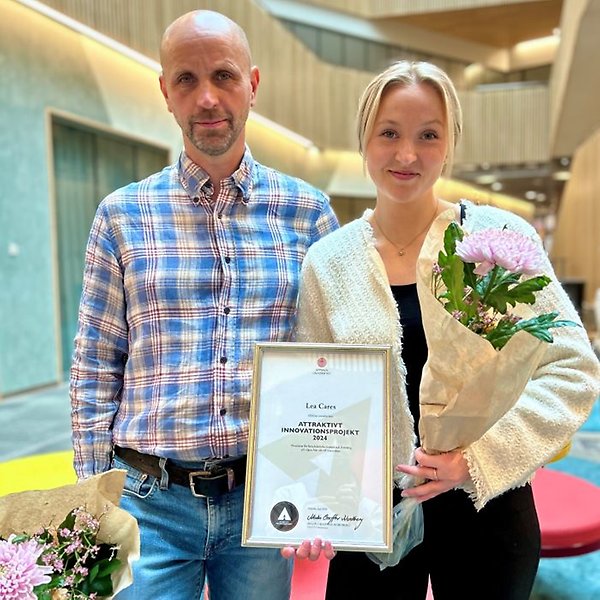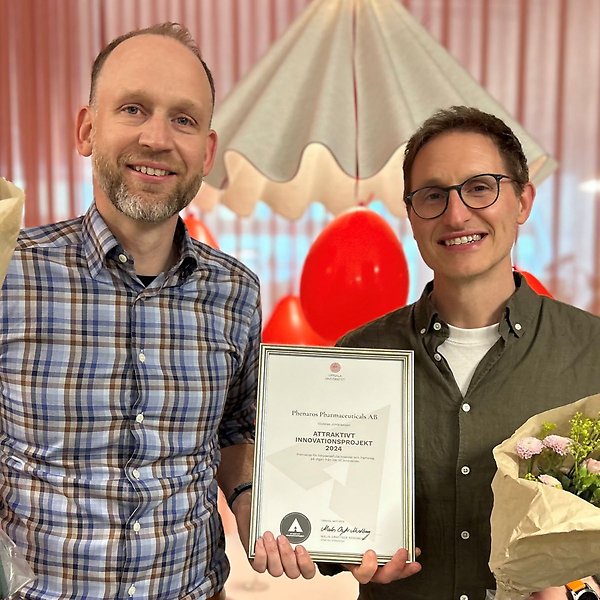2024 Award Winners
The projects or startups that have been awarded the Attractive Innovation Project award by UU Innovation are regularly presented here.
Lea Cares
Lea Cares is commercialising an innovative technology that enables the release of the minerals silicon and calcium locally, resulting in increased collagen growth that can contribute to stronger hair, skin and nails. The company's first product is a nail oil, which was launched in 2023. More cosmetic products are in development and the company also sees opportunities for more application areas. Earlier this year, Lea Cares received a patent for its bioactive mineral technology in Europe and has received seed investment through Linnéa Capital and attracted angel capital.
The inventors of the technology, and founders of Lea Cares, are Viktoria Engqvist, Master of Science in Pharmacy, and Håkan Engqvist, Professor of Applied Materials Science at Uppsala University.

Håkan Engqvist and Viktoria Engqvist are the founders of Lea Cares AB.
Phenaros Pharmaceuticals
Jordi Carreras Puigvert and Ola Spjuth, from the Department of Pharmaceutical Biosciences, have devised a screening method for potential drugs. By integrating artificial intelligence with phenomics, which involves large-scale morphological profiling, and automation, this approach can furnish crucial insights into the promise of new drug candidates from an early stage. Consequently, it holds the promise of accelerating the identification and advancement of genuinely promising drug candidates for pharmaceutical companies, thereby saving valuable time and resources.
The research team has established Phenaros Pharmaceuticals AB, which secured its initial investment through Connect Uppsala's network and also achieved its first sale. With the objective of expediting and ensuring the safety of drug development, the team is actively exploring the most viable routes to market.

Ola Spjuth and Jordi Carreras Puigvert have established Phenaros Pharmaceuticals AB to commercialise their promising screening method for potential drugs.
SeisMove
The demand for precise ground surveys in urban environments has risen due to significant investments in advanced infrastructure projects such as tunneling. Concurrently, seismic surveys in cities, tunnels, and mines face particular challenges related to electrical noise and logistical constraints. To enhance measurements in these challenging settings, Professor Alireza Malehmir and his team from the Department of Earth Sciences have developed a seismic landstreamer. This innovative solution features numerous sensors mounted on sleds that can be connected and towed, for instance, behind a vehicle, often a seismic source.
The landstreamer has been tested in various infrastructure projects, including tunneling, CO2 storage, and mining environments. The results indicate significant potential, attracting substantial global interest and leading to commercial sales. The landstreamer incorporates patented technology and is registered under the SeisMove trademark.

Alireza Malehmir (center) with colleagues Grzegorz Paletko and Magdalena Markovic, who have been involved in the development and first commercial sale of SeisMove.
AVulotion
Acute myocardial infarction (AMI) with subsequent heart failure is the leading cause of hospitalisation and death in the Western world. In Sweden, nearly 18 000 people per year suffer from AMI, including almost 6 000 from STEMI – a condition typically involving a complete blockage of a coronary artery. A major issue with the current standard treatment for STEMI patients is that it can cause additional damage to heart tissue, increasing the risk of complications such as heart failure.
In close cooperation between research and clinical practice, Karl-Henrik Grinnemo, Sergey Rodin, and Oscar Simonson at the Department of Surgical Sciences have developed a concept to generate extracellular vesicles (CARMEV) that are immunomodulatory and have proven effective in preventing heart failure after myocardial infarction and in other severe inflammatory conditions. This makes CARMEV the first biological product capable of preventing damage caused by the treatment of acute myocardial infarction. Supported by an investment from UU Invest AB, the research team has founded the company AVulotion to scale up the production of CARMEV, in collaboration with NorthX Biologics. Their goal is to create a standard medication for the treatment of patients with myocardial infarction.

In close cooperation between research and clinical practice, Sergey Rodin, Karl-Henrik Grinnemo, and Oscar Simonson at the Department of Surgical Sciences have developed CARMEV and founded the company AVulotion to pursue their goal of creating a standard medication for the treatment of patients with myocardial infarction.
